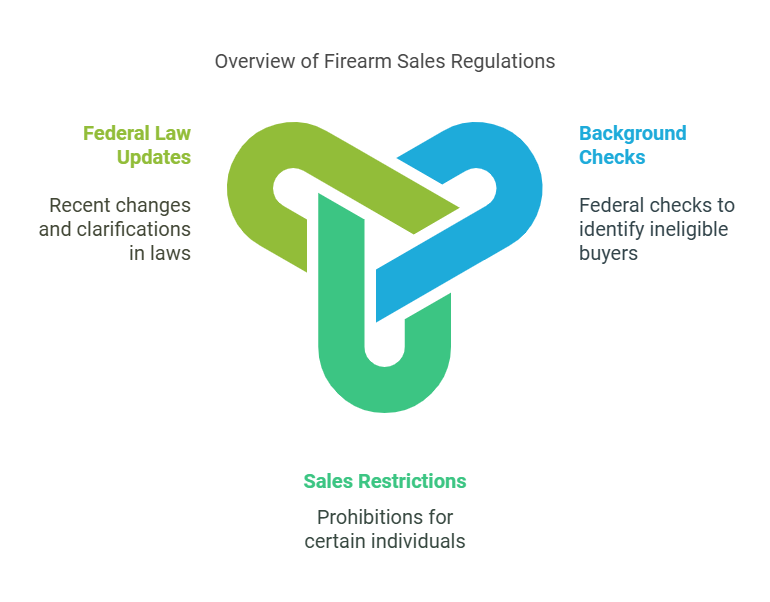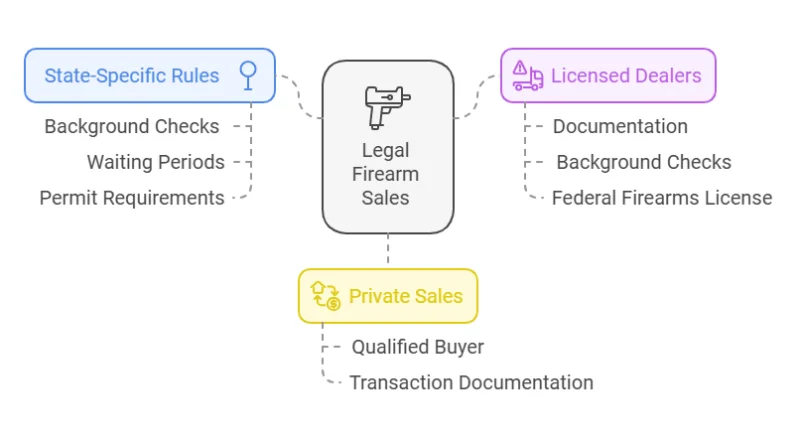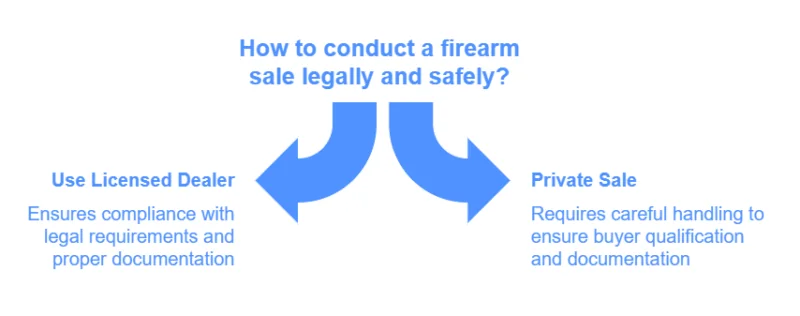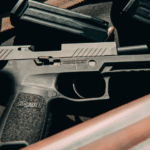Selling a firearm in the United States comes with significant responsibilities and legal considerations. Each transaction must comply with both federal and state laws to ensure it is carried out correctly. For many individuals, this process can feel complex, as firearms are not just ordinary items—they require careful handling to meet legal and ethical standards.
Whether you are selling a firearm as part of a personal decision or assisting someone in need of a new piece, understanding the necessary steps is essential.
You must ensure that the firearm is transferred to someone legally permitted to own it while also protecting yourself from any potential legal repercussions. This guide will provide the clarity and straightforward instructions you need to make the process smooth, secure, and fully compliant with the law.
Let us examine the requirements and practical steps to help you sell a firearm legally and confidently, while avoiding common pitfalls along the way.
Follow Federal Laws for Firearm Sales
These laws ensure that firearms are transferred responsibly and to eligible individuals, reducing risks of legal complications.
Federal Rules
- Sellers who engage in firearm sales as part of their livelihood must secure a Federal Firearms License.
- The ATF enforces rules about the frequency and purpose of sales to determine whether an FFL is needed.
- Even infrequent sales could require licensing if profit is the primary goal.
Background Check Requirements

Federal law mandates background checks for all sales conducted by licensed dealers.
These checks, performed through the National Instant Criminal Background Check System, identify ineligible buyers.
Restrictions on Sales
Firearms cannot be sold to individuals prohibited under federal law, such as those with felony convictions, active restraining orders, or mental health adjudications.
Sellers must verify that buyers meet all legal qualifications before completing a sale.
Updates on Federal Laws
The Bipartisan Safer Communities Act increased scrutiny on private sales, expanding the scenarios where an FFL is necessary.
In 2024, the ATF clarified definitions around “engaged in the business,” ensuring that more transactions comply with licensing requirements.
Practical Steps for Sellers
- Verify if you need a license for your sale.
- Complete background checks if using an FFL.
- Stay updated on federal rules and changes.
Consult a firearms attorney like lawrina.org before selling a firearm to ensure compliance with all federal and state laws. Legal advice can protect you from unintended violations and provide clarity on your obligations.
Check State-Specific Rules

State laws can vary significantly and may impose additional requirements to ensure the legality of the transaction.
- Some states mandate background checks for all private sales, requiring sellers to process these checks through a licensed dealer.
- Other states enforce waiting periods, where a buyer cannot take possession of the firearm immediately after the sale.
- States like California and New York have strict permit and licensing requirements, even for private sales.
Use a Licensed Dealer for Safe Transactions

Selling through a licensed dealer offers a reliable way to comply with legal requirements and protect both the seller and buyer. Licensed dealers ensure that all necessary steps are followed, including proper documentation and background checks.Dealers hold a Federal Firearms License, allowing them to facilitate firearm sales and transfers legally.
They process background checks through the National Instant Criminal Background Check System, ensuring that buyers meet federal and state eligibility requirements.
Complete a Private Sale Without Breaking Laws
Private sales remain a legal option in many states, but the process must be handled carefully to comply with both federal and state regulations. Sellers hold the responsibility to ensure that the firearm is transferred to a qualified buyer while documenting the transaction for protection.
Steps to Follow in a Private Sale
The first step involves confirming that the buyer is legally allowed to own a firearm. This includes checking that they are of legal age and have no disqualifying history, such as felony convictions or restraining orders. In states requiring background checks for private sales, you must involve a licensed dealer to complete this process.
Another crucial element is the documentation of the sale. Create a bill of sale that includes the firearm’s details, the date of the sale, and the names of both the seller and the buyer. This document serves as proof that the transaction occurred legally and can protect you if the weapon is misused after the sale.
Lastly, check local and state laws for any additional requirements. Some states demand waiting periods, purchase permits, or even safety training certificates before a private sale can be finalized. By researching these details, you avoid legal pitfalls that could jeopardize the transaction.
Legal Restrictions on Buyers
The law disqualifies several groups from purchasing weapons. These include convicted felons, fugitives, individuals under active restraining orders, and anyone who has been adjudicated as mentally incompetent. Federal regulations also restrict sales to individuals under 18 for long guns and under 21 for handguns.
Some states impose additional rules, such as prohibiting sales to individuals without firearm permits or those with specific misdemeanors on their records. Sellers must understand and comply with these requirements to avoid liability.
How to Confirm Buyer Eligibility
For private sales, sellers should ask the buyer to provide proof of eligibility, such as a valid firearm license, state-issued ID, or purchase permit if required by state law. If the state mandates a background check, the sale must involve a licensed dealer to conduct this step.
While federal law does not require background checks for private sales in all states, ensuring the buyer’s legal status is essential to avoid legal repercussions. Taking reasonable steps to verify eligibility protects both the seller and the community.
Handle Interstate Sales According to the Law
Selling across state lines introduces additional legal considerations that require careful adherence to federal regulations. Unlike local or in-state sales, interstate transactions are more strictly regulated to ensure the weapon is transferred safely and lawfully.
Federal Rules for Interstate Sales
Federal law mandates that all weapons transfers between individuals from different states go through a licensed dealer. This requirement ensures the buyer undergoes a background check and complies with the laws in their home state. Attempting to sell or transfer a firearm directly to someone in another state without using a licensed dealer is a federal offense.
Steps to Legally Complete an Interstate Sale
- Locate a Licensed Dealer in the Buyer’s State: Work with the buyer to identify a licensed dealer in their state who can facilitate the transfer.
- Ship Through Authorized Channels: Ensure the firearm is shipped directly to the licensed dealer and not to the buyer. Shipping requires adherence to federal regulations, and certain carriers may have specific policies for handling firearm shipments.
- Confirm the Buyer’s Eligibility: The dealer will handle the background check process to verify the buyer’s legal status and ensure compliance with state laws.
- Finalize the Transaction with Documentation: After the dealer completes the transfer, ensure you receive proof of the transaction for your records.
Record the Sale for Legal Protection
A well-documented transaction ensures that you can prove the sale was conducted legally and that the weapon is no longer in your possession.
Without proper records, you could be held liable if the firearm is later used in a crime or discovered in a situation that raises legal questions. A bill of sale provides clarity and helps establish the chain of custody for the firearm.
Creating a Proper Bill of Sale
- Names and Contact Information: Record the full legal names, addresses, and contact details of both the buyer and seller.
- Description: Include information such as the make, model, serial number, and caliber of the firearm being sold.
- Date and Location of the Sale: Specify the date and location where the transaction took place.
- Price and Payment Method: Clearly state the agreed-upon price and how payment was made.
- Signatures: Ensure both parties sign the bill of sale to confirm the transaction.
FAQs
Conclusion
Selling a firearm in the United States involves more than simply finding a buyer. The legal responsibilities and considerations are significant, requiring sellers to comply with federal, state, and sometimes local laws. Understanding the specific requirements for licensing, background checks, and documentation ensures that the transaction is both lawful and secure.







